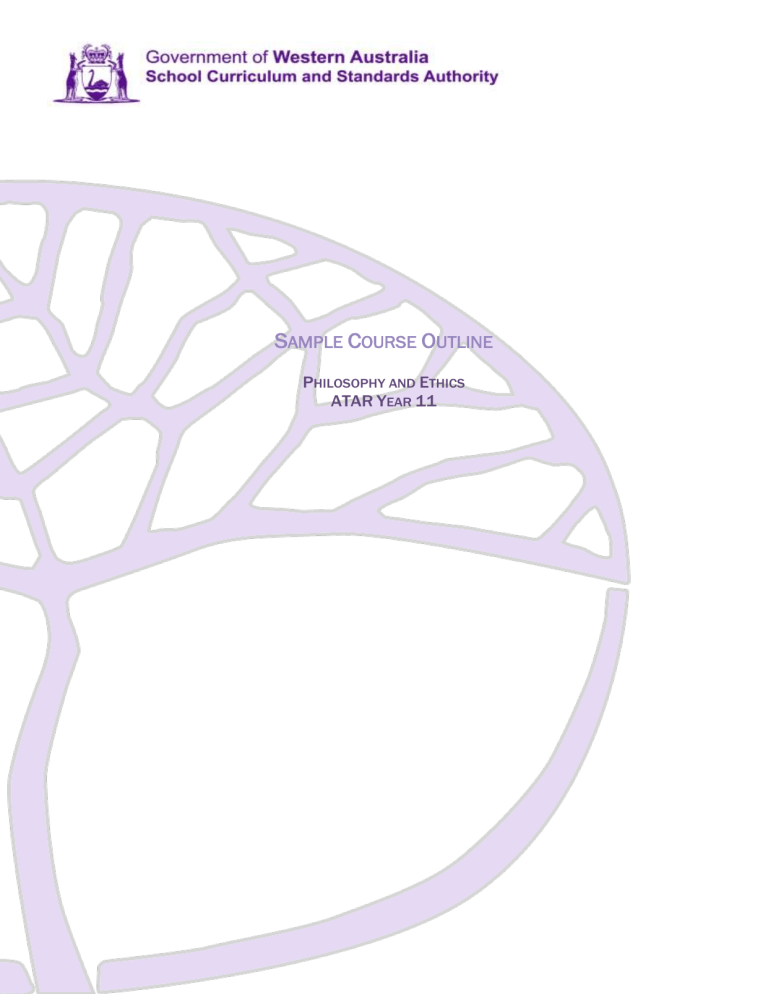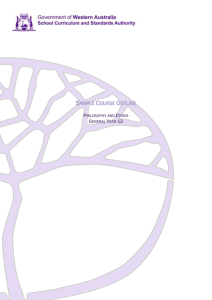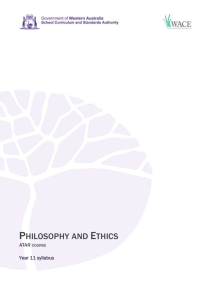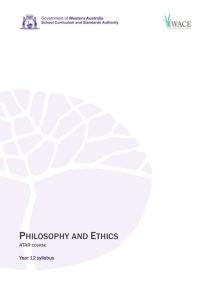Word Format

S
AMPLE
C
OURSE
O
UTLINE
P
HILOSOPHY AND
E
THICS
ATAR Y
EAR
11
Copyright
© School Curriculum and Standards Authority, 2014
This document – apart from any third party copyright material contained in it – may be freely copied, or communicated on an intranet, for non-commercial purposes in educational institutions, provided that the School Curriculum and Standards Authority is acknowledged as the copyright owner, and that the Authority’s moral rights are not infringed.
Copying or communication for any other purpose can be done only within the terms of the Copyright Act 1968 or with prior written permission of the School Curriculum and Standards Authority. Copying or communication of any third party copyright material can be done only within the terms of the Copyright Act 1968 or with permission of the copyright owners.
Any content in this document that has been derived from the Australian Curriculum may be used under the terms of the Creative
Commons Attribution-NonCommercial 3.0 Australia licence
Disclaimer
Any resources such as texts, websites and so on that may be referred to in this document are provided as examples of resources that teachers can use to support their learning programs. Their inclusion does not imply that they are mandatory or that they are the only resources relevant to the course.
2014/9625v5
Sample course outline
Philosophy and Ethics – ATAR Year 11
Unit 1 and Unit 2
Semester 1 – Reason and persons
Week
1–3
4–6
Key teaching points
Content
recognising and evaluating an argument written in natural language in terms of its premises, inferences and conclusions
recognising statements in a variety of texts as either argumentative, descriptive, narrative or explanatory
the distinction between empirical evidence and rational proof
inductive and deductive arguments
understanding modus ponens and modus tollens
distinction between perception, rational reflection and various sources of imagination
types of inquiry: dialectic
the relationship between reason and imagination
observation and thought experiment
Task 1: Critical reasoning
Key teaching points
Critical reasoning and methods of inquiry
Premises, inferences and conclusions
Argument and analysis
Inductive and deductive arguments
Modus ponens and modus tollens
Empirical evidence and rational proof
Types of inquiry: dialectic
Observation and thought experiments
The community of inquiry (See rationale page 1 of the syllabus)
Content
different ideas of human nature
concepts of action, intention, will, motives and reasons science as a way of classifying the world and constructing our understanding of what is real in human nature
the idea of free will
the concepts of change and causation conceptual difficulties with free will, determinism and agency (human action)
Task 2: Philosophical analysis and evaluation (article/extract)
Key teaching points
Freedom, authenticity and autonomy
Empiricism/Rationalism – Locke and Descartes
Causality and change
Hume – Problem of induction
Causation and determinism – Hobbes, Compatibilism
Thought experiments on human agency, determinism and free will
Sample course outline | Philosophy and Ethics | ATAR Year 11
1
2
Week
7–9
10–12
13–15
16
Key teaching points
Content
the concepts of mind, body and personhood
the ideas of personal identity, gender, race, class and ethnicity
the concept of being ‘an individual’
the relationship between individuals and societies
Task 3: Construction of argument
Key teaching points
Dualism and materialism
Descartes and Hobbes
Thought experiments on the mind/body dichotomy
Locke and Hume on identity
Content
the social element in individual identity
the ideas of justice, fairness and power relations, including race, gender and class the distinction between contractual and non-contractual relationships
Key teaching points
Individuality and justice
Plato and justice
Aristotle and justice
Agreement, mediation and cooperation
Friendship
Contractual and non-contractual relationships
Content
the concept of care
the role of principled decisions in ethics, including the Golden Rule, the greatest happiness principle, and the categorical imperative
the nature of virtues and vices and their relationship to the development of character and ethical action
Task 4: Philosophical analysis and evaluation
(community of inquiry dialogue)
Key teaching points
Virtue ethics
Care ethics – Milton Mayeroff, Carol Gilligan
Deontological and Consequentialist approaches to ethical decisions
Golden Rule
Utilitarianism
Kant on Ethics
The community of inquiry
Task 5: Semester 1 examination
Sample course outline | Philosophy and Ethics | ATAR Year 11
Semester 2 – Reason and culture
Week
1–2
3–5
6–7
Key teaching points
Content
distinguishing between strong and weak arguments, written in natural language, in terms of inferential strength and the concept of cogency
identifying the formal fallacies of denying the antecedent and affirming the consequent
the role of metaphor and analogy in inquiry
identifying some of the major informal fallacies, including the genetic fallacy, ad hominem arguments, hasty generalisation, argument from irrelevant authority, argument from ignorance and equivocation
Task 6: Critical reasoning
Key teaching points
Strong and weak arguments (cogency)
Formal fallacies
Informal fallacies
Metaphor and analogy
Content
the concept of culture, including shared values and social values
the concept of self-expression and its relation to culture
use of symbols, signs and signification (semiosis) to understand the world
use of symbols and concepts to understand the way things are
Key teaching points
The anthropological concept of culture
The artistic concept of culture
Symbols and semiotics – signs, signification and representation
Wittgenstein and language games – meaning as use, family resemblances, rule following and conventions, culture/custom
Content
the concept of interpretation
criteria for good interpretations, including coherence, consistency, comprehensiveness and consilience
types of inquiry: hermeneutics
imagination as a necessary element in interpretation
the use of observation, hypotheses and theories in constructing explanations
the question of objectivity and subjectivity
disputes about realism and the limits of interpretation, including modernism and postmodernism
Task 7: Philosophical analysis and evaluation (article/extract)
Key teaching points
The concept of good interpretation
The relationship between text and context
Interpretation and imagination
Constructing explanations from hypothesis, observations and theory
Realism and Antirealism – Correspondence, Coherence and Pragmatic theories of truth
3
Sample course outline | Philosophy and Ethics | ATAR Year 11
4
Week
8–9
10–13
14–15
Key teaching points
Content
how works of art and literature help the understanding of human nature and identity
the process of interpreting works of art and literature
ideas of truth, representation and reality, and their interrelationship
aesthetic concepts, including beauty, taste and judgement
perception and aesthetic appreciation
Task 8: Construction of argument
Key teaching points
Aesthetics and the concept of beauty
Participating in beauty
Beauty and taste – Kant
Interpreting paintings, literature and/or sculpture
Indigenous beauty and truth
Content
the concept of rights
freedom of expression and its limits
privacy and its limits
government interference and surveillance
Task 9: Philosophical analysis and evaluation (community of inquiry dialogue)
Key teaching points
The natural pursuit of rights – Locke
Natural rights and social rights/civil liberties
Limitations on natural rights by the community e.g. speech
Censorship and creative expression
CCTV in public spaces as security or invasion of privacy?
Content
interrelationships between personhood, emotion and reason
the I-thou relationship as a fundamental element of ethics the concept of friendship
Key teaching points
Types of Friendship - Aristotle and Eudemonia (Human Flourishing/Good Spirit)
Ethical Theories (Consequentialism, Deontological and Virtue Ethics – Unit 1) and the natural pursuit of eudemonia within cultures
I-thou or self/other relationships in virtue ethics
16 Task 10: Semester 2 examination
Sample course outline | Philosophy and Ethics | ATAR Year 11












